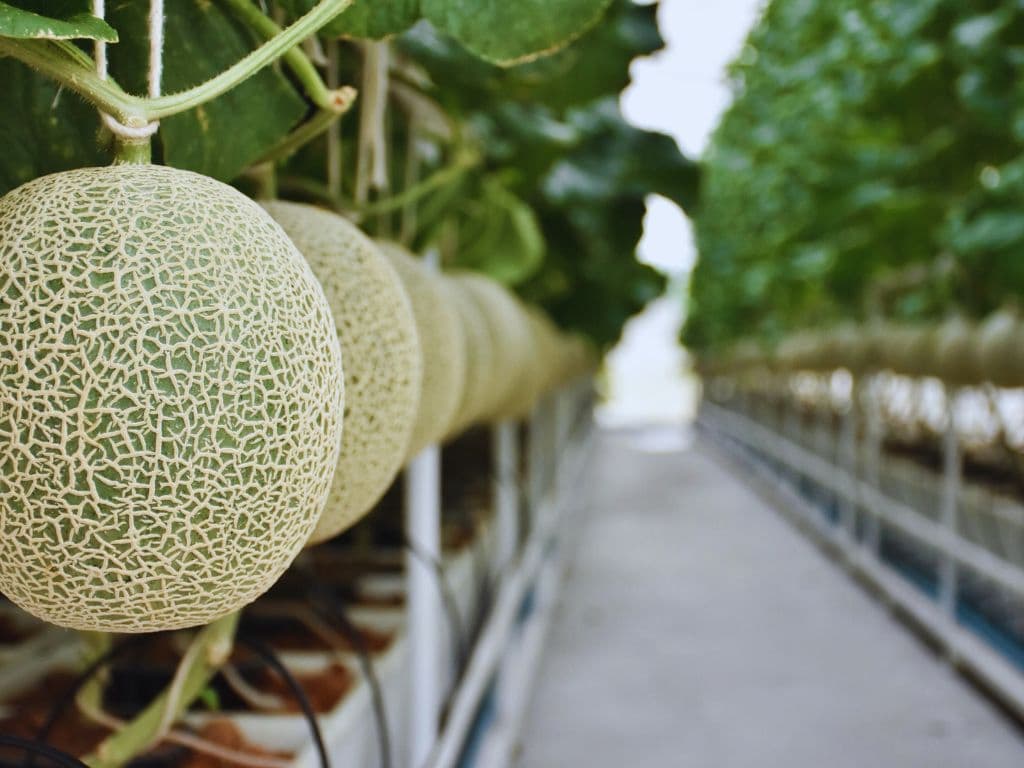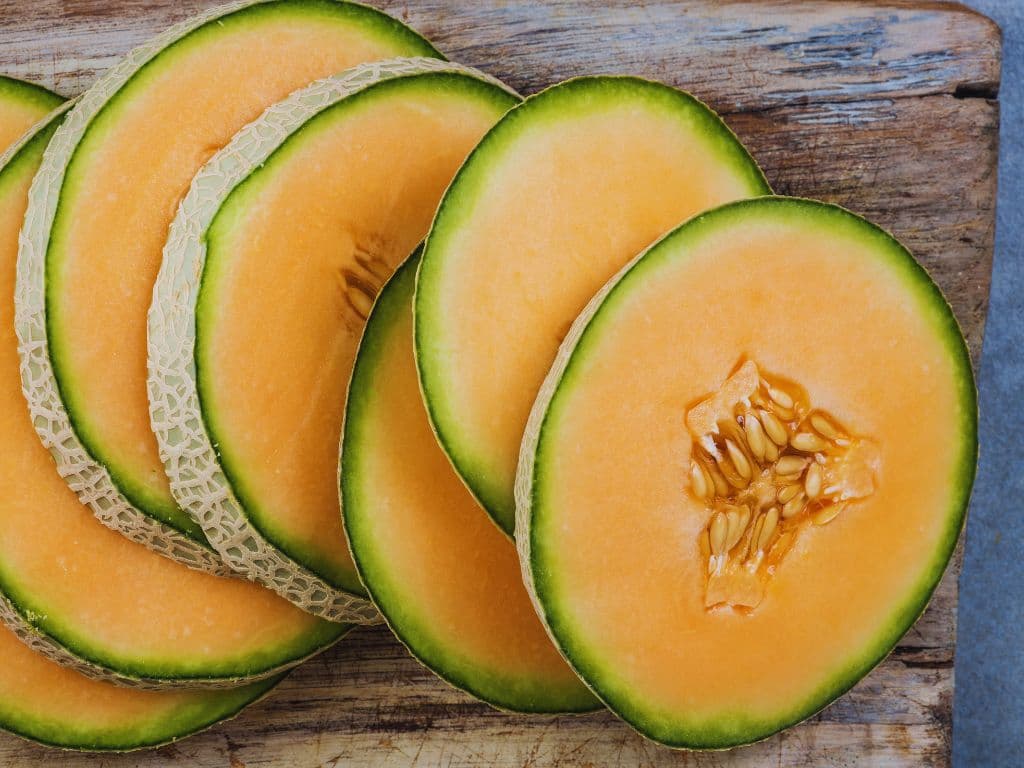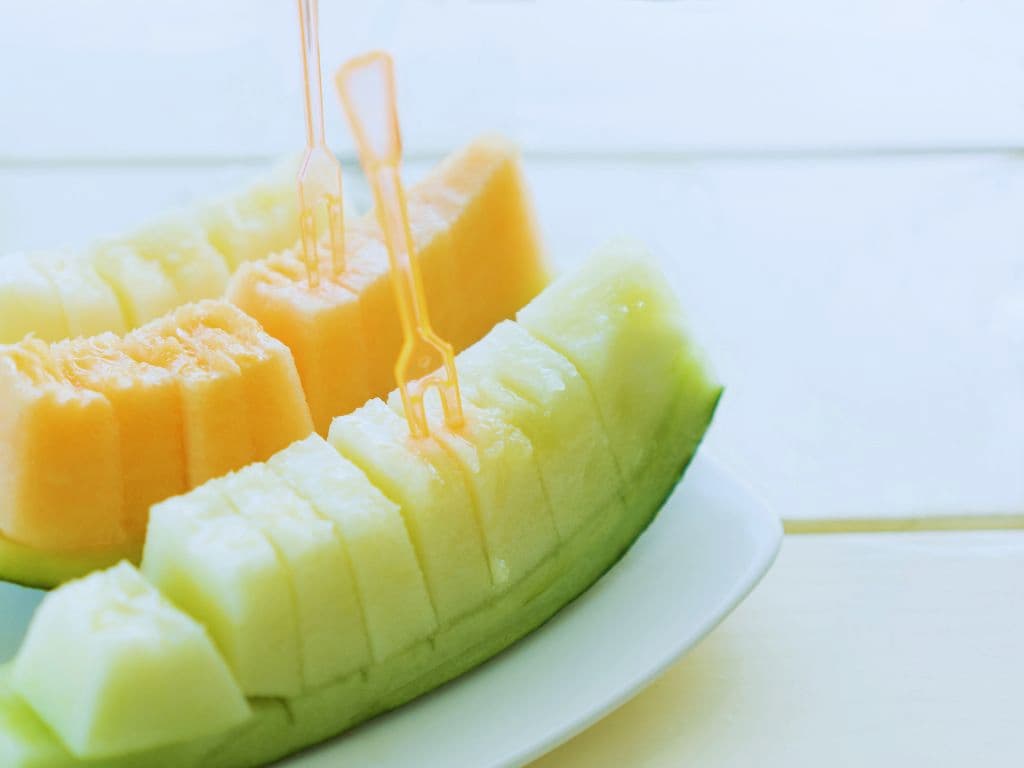If you're a big fan of fruits then you'd be surprised to know how many of them are off limits on the keto diet.
Those that enjoy eating cantaloupes are probably wondering Is cantaloupe keto friendly? Well maybe. Cantaloupes do contain carbohydrates and eating too much will definitely put you out of ketosis.

Keep reading to learn more about the keto friendliness of Cantaloupes.
Is Cantaloupe Keto Friendly?
Cantaloupe is a delicious and refreshing fruit that many enjoy, but is it suitable for the keto diet? Let's take a closer look at the nutritional content of cantaloupe and how it fits into a low-carb, high-fat diet.
Nutritional Content of Cantaloupe
A cup of diced cantaloupe (about 160 grams) contains approximately:
- 60 calories
- 0.4 grams of fat
- 14.4 grams of carbohydrates
- 1.6 grams of fiber
- 12.8 grams of sugar
- 1.3 grams of protein
Cantaloupe is a good source of vitamin A and vitamin C, as well as potassium and fiber. It is also low in calories, making it a great option for those who are watching their calorie intake.
How Cantaloupe Fits into the Keto Diet
The keto diet is a low-carb, high-fat diet that aims to put your body into a state of ketosis, where it burns fat for energy instead of carbohydrates. To achieve ketosis, you need to limit your carbohydrate intake to 20-50 grams of net carbs per day.

Unfortunately, cantaloupe is not considered keto-friendly due to its relatively high carbohydrate content. A cup of diced cantaloupe contains around 14.4 grams of net carbs, which is a significant amount when you consider that you need to limit your carbohydrate intake to 20-50 grams per day on the keto diet.
However, if you are following a more liberal low-carb diet, you may be able to enjoy cantaloupe in moderation. Just be sure to track your daily carb intake and make sure that the cantaloupe fits into your overall macronutrient goals.
If you do choose to include cantaloupe in your low-carb diet, it's best to consume it in small amounts and pair it with a source of protein or healthy fat to help balance out your macronutrient intake.
Benefits of Adding Cantaloupe to your Keto Diet
Cantaloupe is a delicious and nutritious fruit that may not be suitable for strict keto diets due to its higher carb content.
However, if you're following a more liberal low-carb diet, you may want to consider adding cantaloupe to your meals. Here are some potential health benefits of cantaloupe and how it can add flavor and variety to your keto diet.
- Rich in Nutrients: Cantaloupe is a good source of vitamin A and vitamin C, both of which are important for maintaining healthy skin, immune function, and vision. It also contains potassium, which helps regulate blood pressure and supports heart health.
- Hydrating: Cantaloupe is mostly made up of water, making it a great option for staying hydrated during the hot summer months.
- Low in Calories: Cantaloupe is a low-calorie fruit, with a cup of diced cantaloupe containing approximately 60 calories. This makes it a great option for those who are trying to watch their calorie intake.
- Anti-inflammatory: Cantaloupe contains anti-inflammatory compounds such as beta-carotene and vitamin C, which may help reduce inflammation in the body.
Adding Cantaloupe to Your Keto Meals
- As a Snack: Cantaloupe makes a great snack on its own or paired with nuts or seeds for some healthy fats and protein.
- In a Salad: Cantaloupe can add a sweet and refreshing flavor to any salad. Try pairing it with spinach, feta cheese, and a balsamic vinaigrette.
- In a Smoothie: Cantaloupe can be added to a low-carb smoothie with some almond milk, spinach, and protein powder for a nutritious and filling meal.
- Grilled: Grilled cantaloupe can be a tasty and unexpected addition to any meal. Simply slice the cantaloupe into wedges and grill for a few minutes on each side.
While cantaloupe may not be suitable for strict keto diets, it can provide several potential health benefits and add flavor and variety to your low-carb meals. If you're following a more liberal low-carb diet, consider incorporating cantaloupe into your snacks, salads, smoothies, or even grilling it for a delicious and nutritious meal.
Recipe ideas for using Cantaloupe on the Keto Diet
Cantaloupe is a sweet, juicy fruit that can be used in many recipes. Here are a few low-calorie recipes using cantaloupe that you can sometimes enjoy on keto too!

- Keto Cantaloupe Smoothie
Ingredients:
- 1 cup diced cantaloupe
- 1/2 cup unsweetened almond milk
- 1/2 cup coconut cream
- 1/4 cup ice
- 1 scoop vanilla protein powder (optional)
- Stevia or keto-friendly sweetener (to taste)
Instructions:
- Combine all ingredients in a blender and blend until smooth.
- Adjust sweetness to taste with stevia or keto-friendly sweetener.
- Serve immediately.
2. Keto cantaloupe salad
Ingredients:
- 2 cups baby spinach
- 1 cup diced cantaloupe
- 1/4 cup crumbled feta cheese
- 2 tbsp chopped pecans
- 2 tbsp olive oil
- 1 tbsp balsamic vinegar
- Salt and pepper to taste
Instructions:
- In a large bowl, combine baby spinach, diced cantaloupe, crumbled feta cheese, and chopped pecans.
- In a small bowl, whisk together olive oil, balsamic vinegar, salt, and pepper to make the dressing.
- Drizzle the dressing over the salad and toss to combine.
- Serve immediately.
3. Keto cantaloupe and prosciutto skewers
Ingredients:
- 1/2 cantaloupe, cut into bite-sized cubes
- 4 oz prosciutto, sliced into thin strips
- Fresh basil leaves
- Wooden skewers
Instructions:
- Thread a piece of cantaloupe, followed by a strip of prosciutto and a basil leaf, onto a wooden skewer.
- Repeat until all ingredients are used.
- Serve immediately.
These recipes are easy to prepare, delicious, and keto-friendly. They are great options for incorporating cantaloupe into your keto diet. Enjoy!
Precautions when Consuming Cantaloupe on the Keto Diet
Although you can enjoy cantaloupe on the keto diet, there are a few precautions you should keep in mind:
Potential Digestive Issues:
Cantaloupe contains fiber which can cause digestive issues such as bloating and gas, especially if you're not used to consuming high-fiber foods.
To avoid these issues, start with a small portion and gradually increase your intake as your body adjusts.
Carbohydrate Content:
Cantaloupe is relatively high in carbohydrates compared to other keto-friendly fruits and vegetables. One cup of diced cantaloupe contains approximately 12 grams of carbs.
If you're following a strict keto diet, it's important to be mindful of your carbohydrate intake and limit your portion sizes accordingly.
Proper Storage and Handling:
Cantaloupe is a perishable fruit and should be stored properly to avoid the risk of foodborne illness.
It's important to wash the cantaloupe thoroughly before cutting it to remove any bacteria on the surface. After cutting, store the cantaloupe in an airtight container in the refrigerator and consume it within a few days.
Allergies:
If you have a known allergy to cantaloupe, it's important to avoid consuming it or any dishes that may contain it. Symptoms of an allergic reaction can include itching, swelling, and difficulty breathing.
While cantaloupe can be a nutritious and delicious addition to your keto diet, it's important to be mindful of your portion sizes and potential digestive issues.
Proper storage and handling are also important to avoid any risk of foodborne illness. If you have a known allergy to cantaloupe, it's best to avoid consuming it altogether.

Alternative Low-Carb Fruits for the Keto Diet
If cantaloupe isn’t the right fruit for you or if it doesnt fit into your dietary needs, there are a lot of other low-carb fruits you can try.
- Berries:
Berries, such as strawberries, raspberries, and blackberries, are low in carbohydrates and high in fiber, making them a great option for the keto diet. One cup of strawberries contains only 8 grams of carbs and 3 grams of fiber while also providing a good source of vitamin C and antioxidants. Berries are also naturally sweet, making them a great addition to smoothies or a topping for yogurt or chia pudding.
- Avocado:
While technically a fruit, avocado is low in carbs and high in healthy fats, making it a perfect addition to the keto diet. One avocado contains approximately 12 grams of carbs and 10 grams of fiber, making it a great source of healthy fats and fiber. Avocado is also versatile and can be used in a variety of keto-friendly dishes, such as salads, dips, and smoothies.
- Tomatoes:
Tomatoes are another low-carb fruit that can be enjoyed on the keto diet. One medium-sized tomato contains only 5 grams of carbs and 1.5 grams of fiber while also providing a good source of vitamin C, potassium, and lycopene. Tomatoes are also flavorful and can be used in a variety of dishes, such as salads, sauces, and soups.
- Lemons:
Although these are not typically eaten on their own, lemons are a great low-carb fruit to add flavor to keto dishes. One lemon contains approximately 5 grams of carbs and 2 grams of fiber while also providing a good source of vitamin C and antioxidants. Lemon juice can be used in dressings, marinades, and sauces to add flavor without adding many carbs.
There are many ways you can incorporate keto friendly fruits into your keto diet:
- Use berries as a topping for yogurt or chia pudding.
- Add avocado to salads, dips, and smoothies.
- Use tomatoes in salads, sauces, and soups.
- Use lemon juice in dressings, marinades, and sauces.
- Use low-carb fruits to add sweetness to keto desserts, such as whipped cream or mousse.
There are many alternative low-carb fruits that can be enjoyed on the keto diet. Berries, avocados, tomatoes, and lemons are all great options that provide a variety of flavors and nutritional benefits. By incorporating these fruits into your keto meals, you can add flavor and nutrition while staying within your carb limit.
Frequently Asked Questions about Cantaloupe and the Keto Diet
Can you eat cantaloupe on the keto diet if you have diabetes?
If you have diabetes, it's important to monitor your carbohydrate intake to manage your blood sugar levels. Cantaloupe is relatively high in carbohydrates compared to other keto-friendly fruits and vegetables, so it's important to consume it in moderation. One cup of diced cantaloupe contains approximately 12 grams of carbs. It's always best to consult with your healthcare provider or a registered dietitian to determine if a cantaloupe is appropriate for your individual needs.
Are the seeds of cantaloupe keto-friendly?
Yes, the seeds of cantaloupe are keto-friendly. They are a good source of fiber and healthy fats, making them a nutritious addition to your keto diet. You can roast them for a crunchy snack or add them to smoothies for added nutrition.
Can cantaloupe help boost weight loss on the keto diet?
Cantaloupe is relatively low in calories and high in fiber, which can help promote feelings of fullness and reduce overall calorie intake.
However, it's important to remember that weight loss on the keto diet ultimately comes down to maintaining a calorie deficit. While cantaloupe can be a nutritious addition to your diet, it's important to consume it in moderation and stay within your daily calorie and carbohydrate limits.
Conclusion
Cantaloupe can be a delicious and nutritious addition to your keto diet when consumed in moderation. It's relatively low in calories, high in fiber, and packed with important vitamins and minerals.
However, it's important to be mindful of its carbohydrate content and consume it in moderation, especially if you have diabetes or are trying to maintain ketosis.
If you are following a more liberal low-carb diet, you may be able to enjoy cantaloupe in moderation as long as it fits into your overall macronutrient goals.
But don't stop at cantaloupe! There are plenty of other low-carb fruits and vegetables that can add flavor and nutrition to your keto meals, such as berries, avocados, and leafy greens.
Experiment with different combinations and recipes to keep your keto meals interesting and satisfying.
By incorporating a variety of nutrient-dense, low-carb foods into your keto diet, you can help ensure that you're getting all the important vitamins and minerals your body needs to thrive.
So go ahead and add some cantaloupe or other low-carb fruits to your next meal and enjoy the delicious flavors and potential health benefits they have to offer!
If you'd like to learn more about keto friendly foods, please click on one of the links below:
Are Sweet Potato Fries Keto Friendly?
